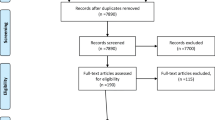Abstract
Respiratory infections are the leading cause of morbidity in community populations. We developed a structured interview based on the Health Review (Roseet al., Psychosom. Med. 40: 142–165, 1978) to provide a simple method for periodic assessment of infectious illness, particularly upper respiratory infections. Congruence between interview data and physician diagnoses demonstrated excellent agreement regarding the presence or absence of an infection. Subjects who showed a clinically significant increase in antibody titers to an influenza virus vaccine reported fewer than half as many respiratory infections in the subsequent year as subjects who did not show a significant response. Interrater and test-retest reliabilities were satisfactory. These data support the reliability and validity of this method of assessing infectious illnesses.
Similar content being viewed by others
References
Beyer, W. E. P., Palache, A. M., Baljet, M., and Masurel, N. (1989). Antibody induction by influenza vaccines in the elderly: A review of the literature.Vaccine 7: 385–394.
Bradburn, N. M., Rips, L. J., and Shevell, S. K. (1987). Answering autobiographical questions: The impact of memory and inference on surveys.Science 236: 157–161.
Burns, E. A., and Goodwin, J. S. (1990). Immunology and infectious disease. In Cassell, C. K., Risenberg, D. E., Sorensen, C. B., and Walsh, J. R. (eds.),Geriatr. Med., Springer-Verlag, New York, pp. 312–329.
Cohen, J. (1960). A coefficient of agreement for nominal scales.Educ. Psych. Measure. 20: 37–46.
Cohen, S., Tyrell, D. A. J., and Smith, A. P. (1991). Psychological stress and susceptibility to the common cold.N. Engl. J. Med. 325: 606–612.
Frank, S., Zyzanski, S., and Akemagno, S. (1992). Upper respiratory infection: Stress, support, and the medical encounter.Family Med. 24: 518–523.
Glaser, R., and Kiecolt-Glaser, J. K. (1994).Handbook of Human Stress and Immunity, Academic Press, San Diego.
Glaser, R., Kiecolt-Glaser, J. K., Bonneau, R., Malarkey, W., and Hughes, J. (1992). Stress-induced modulation of the immune response to recombinant hepatitis B vaccine.Psychosom. Med. 54: 22–29.
Grove, W. M., Andreasen, N. C., McDonald-Scott, P., Keller, M. B., and Shapiro, R. W. (1981). Reliability studies of psychiatric diagnosis: Theory and practice.Arch. Gen. Psychiat. 38: 408–413.
Hobson, D., Curry, R. L., and Beare, A. S. (1972). Hemagglutination-inhibiting antibody titre as a measure of protection against influenza in man. In Perkins, F. T., and Reganey, R. H. (eds.).International Symposium on Influenza Vaccines for Men and Horses, Karger Basel, New York, pp. 164–168.
Jabaaij, P. M., Grosheide, R. A., Heijtink, R. A., Duivenvoorden, H. J., Ballieux, R. E., and Vingerhoets, A. J. J. M. (1993). Influence of perceived psychological stress and distress of antibody response to low dose rDNA hepatitis B vaccine.J. Psychosom. Res. 37: 361–369.
Jenkins, C. D., Krueger, B. E., Rose, R. M., and Hurst, M. W. (1980). Use of a monthly health review to ascertain illness and injuries.Am. J. Public Health 70: 82–84.
Kiecolt-Glaser, J. K., and Glaser, R. (1995). Psychoneuroimmunology and health consequences: Data and shared mechanisms.Psychosom. Med. 57: 269–274.
Kiecolt-Glaser, J. K., Dura, J. R., Speicher, C. E., Trask, O. J., and Glaser, R. (1991). Spousal caregivers of dementia victims: Longitudinal changes in immunity and health.Psychosom. Med. 53: 345–362.
Levine, M., Beattie, B. L., McLean, D. M., and Corman, D. (1987). Characterization of the immune response to trivalent influenza vaccine in elderly men.J. Gerontol. Soc. 35: 609–615.
Maddox, G. L., and Douglass, E. B. (1973). Self-assessment of health: A longitudinal study of elderly subjects.J. Health Soc. Behav. 14: 87–93.
McElhaney, J. E., Beattie, B. L., Devine, R., Grynock, R., Toth, E. L., and Bleackley, R. C. (1990). Age-related decline in interleukin 2 production in response to influenza vaccine.J. Am. Geriat. Soc. 38: 652–658.
Mechanic, D. (1980). The experience and reporting of common physical complaints.J. Health Soc. Behav. 21: 146–155.
Ochs, H. D., Junker, A. K., Collier, A. C., Virant, F. S., Hunter, H. H., and Wedgewood, R. J. (1988). Abnormal antibody responses in patients with persistent generalized lymphadenopathy.J. Clin. Immunol. 8: 57–83.
Phair, J., Kauffman, C. A., Bjornsen, A., Adams, L., and Linneman, C. (1978). Failure to respond to influenza vaccine in the aged: Correlation with B-cell number and function.J. Lab. Clin. Med. 92: 822–828.
Pio, A. J., Leowski, J., and ten Dam, H. G. (1985). The magnitude of the problems of acute respiratory infections. In Douglas, R. M., and Kerby-Eaton, E. (eds.),Acute Respiratory Infections in Childhood, Steering Committee, Acute Respiratory Infections in Childhood Workshop, Adelaide Australia, pp. 3–16.
Rose, R. M., Jenkins, C. D., and Hurst, M. W. (1978). Health change in air traffic controllers: A prospective study. I. Background and description.Psychosom. Med. 40: 142–165.
Sanders, L. A., Rijkers, G. T., Kuis, W., Tenbergen-Meekers, A. J., deGraeff-Meeder, B. R., Hiemstra, I., and Zegers, B. J. (1993). Defective antipneumococcal polysaccharide antibody response in children with recurrent respiratory tract infections.J. Allergy Clin. Immunol. 91: 110–119.
Schmitt, N. W., and Colligan, M. J. (1984). Lack of stress-health relationships: A base rate problem?J. Comm. Psychol. 12: 245–252.
Sheridan, J. F., Feng, N., Bonneau, R. H., Allen, C. M., Huneycutt, B. S., and Glaser, R. (1991). Restraint stress differentially affects anti-viral cellular and humoral immune responses in mice.J. Neuroimmunol. 31: 245–255.
Solomon, G. F. (1969). Stress and antibody response in rats.Int. Arch. Allergy 35: 97–104.
Stone, A. A., Neale, J. M., Cox, D. S., Napoli, A., Valdimarsdottir, H., and Kennedy-Moore, E. (1994). Daily events are associated with a secretory immune response to an oral antigen in men.Health Psychol. 13: 440–446.
Yoshikawa, T. T. (1983). Geriatric infectious diseases: An emerging problem.J. Am. Geriat. Soc. 31: 34–39.
Author information
Authors and Affiliations
Additional information
This research and preparation of this article were supported by National Institute of Mental Health Grants R37 MH42096 and R01 MH50538.
Rights and permissions
About this article
Cite this article
Orts, K., Sheridan, J.F., Robinson-Whelen, S. et al. The reliability and validity of a structured interview for the assessment of infectious illness symptoms. J Behav Med 18, 517–529 (1995). https://doi.org/10.1007/BF01857893
Accepted:
Issue Date:
DOI: https://doi.org/10.1007/BF01857893



